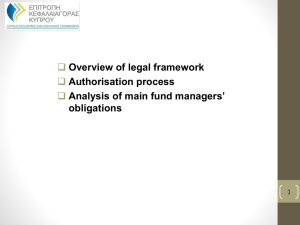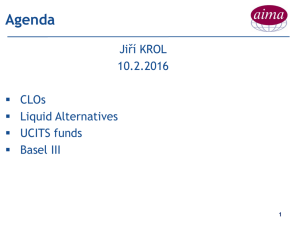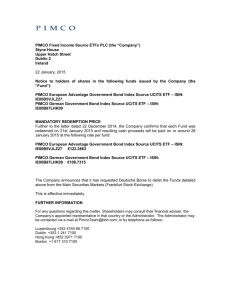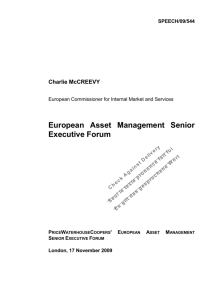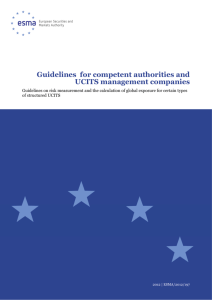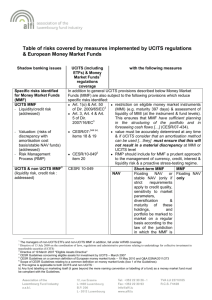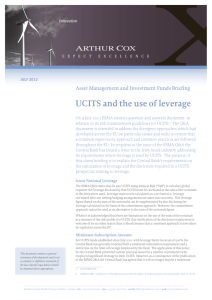IMA proposed amendments to EC proposal regarding depositary
advertisement
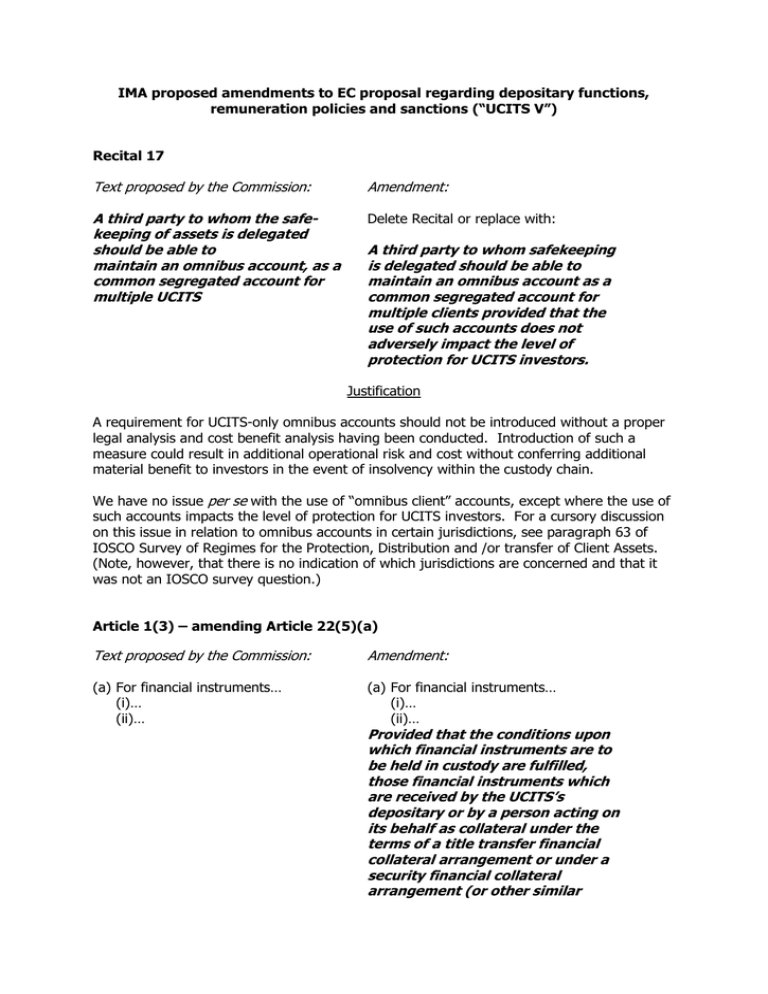
IMA proposed amendments to EC proposal regarding depositary functions, remuneration policies and sanctions (“UCITS V”) Recital 17 Text proposed by the Commission: Amendment: A third party to whom the safekeeping of assets is delegated should be able to maintain an omnibus account, as a common segregated account for multiple UCITS Delete Recital or replace with: A third party to whom safekeeping is delegated should be able to maintain an omnibus account as a common segregated account for multiple clients provided that the use of such accounts does not adversely impact the level of protection for UCITS investors. Justification A requirement for UCITS-only omnibus accounts should not be introduced without a proper legal analysis and cost benefit analysis having been conducted. Introduction of such a measure could result in additional operational risk and cost without conferring additional material benefit to investors in the event of insolvency within the custody chain. We have no issue per se with the use of “omnibus client” accounts, except where the use of such accounts impacts the level of protection for UCITS investors. For a cursory discussion on this issue in relation to omnibus accounts in certain jurisdictions, see paragraph 63 of IOSCO Survey of Regimes for the Protection, Distribution and /or transfer of Client Assets. (Note, however, that there is no indication of which jurisdictions are concerned and that it was not an IOSCO survey question.) Article 1(3) – amending Article 22(5)(a) Text proposed by the Commission: Amendment: (a) For financial instruments… (i)… (ii)… (a) For financial instruments… (i)… (ii)… Provided that the conditions upon which financial instruments are to be held in custody are fulfilled, those financial instruments which are received by the UCITS’s depositary or by a person acting on its behalf as collateral under the terms of a title transfer financial collateral arrangement or under a security financial collateral arrangement (or other similar security arrangement) shall be regarded as being held in custody by the UCITS’s depositary. Conversely, financial instruments provided by the UCITS (or the UCITS management company acting on behalf of the UCITS) to a third party as collateral under the terms of a title transfer financial collateral arrangement or under a security financial collateral arrangement (or under other similar security arrangement) by which the control or possession of the financial instruments has been transferred from the UCITS or the UCITS’s depositary to the collateral taker or a person acting on its behalf shall be outside the scope of financial instruments held in custody by the UCITS’s depositary. Justification These provisions clarify the position in relation to collateral transferred or received by the UCITS whether by way of title transfer or by security interest. It is important to deal explicitly with security interest collateral so as to continue to give the UCITS, and therefore investors, the choice to use this type of collateral mechanism. In certain circumstances, the security interest collateral mechanism can provide better investor protection than title transfer collateral arrangements. Security interest collateral arrangements are often the only way to provide an effective insolvency ring-fence of the collateral assets (subject to meeting all the necessary requirements). The banks have long-favoured the use of title transfer as it enables them to use the collateral. Although this title transfer mechanism has some advantages over a security method, it exposes investors in relation to any over-collateralised amounts in the event of the insolvency of the counterparty, in addition to not receiving back the collateral assets. Article 1(3) – amending Article 22(6) Text proposed by the Commission: Amendment: Member States shall ensure that in the event of insolvency of the depositary, assets of a UCITS held by the depositary in custody are unavailable for distribution among or realisation for the benefit of creditors of the depositary. Delete Justification We support pre and post insolvency protections for client assets. We understand the overarching policy objective of this proposed provision and we support it. However, insolvency law is notoriously complex. This proposed provision seeks to address insolvency law and property law issues across 27 Member States. Any attempt at legislation in this notoriously complex area is not reducible to one sentence. We would support further work on this. It is important to understand that the safety of assets needs to be considered throughout the entire custody chain, so even if the policy behind this provision could be put into effect at depositary level across all Member States, it needs to work for delegates. The issue that EU legislation is unlikely to be able to address is any non-EU intermediary or securities depositary. So, at best, any EU proposal can deal only with an entirely EU chain of custody from depositary through to securities depositary. It will remain the case that any investor who wants to understand the risk to their assets in an international custody system will have to conduct their own country-by-country survey, which is not an easy task. Article 1(3) – amending Article 22(7)(e) Text proposed by the Commission: Amendment: (e) in the event of insolvency of the (e)… Notwithstanding… (a)… (b)… Notwithstanding… (a)… (b)… third party, assets of a UCITS held by the third party in custody are unavailable for distribution among or realisation for the benefit of creditors of the third party; (f)… Notwithstanding point (d) of the third sub-paragraph where, for reasons of the applicable law of a third country, including in particular the law relating to property or insolvency, the arrangements made by the depositary in compliance with point (d) of this third subparagraph are not sufficient to safeguard the UCITS’s ownership rights in the event of the third party’s insolvency, the depositary may delegate its functions to such local entity only where: (a) the depositary has informed the UCITS, or the management company on behalf of the UCITS, of the risk involved in such delegation; (b) the investors of the relevant UCITS are duly informed prior to their investment that the risk of such delegation is required to effect the investment strategy of the UCITS; (c) the UCITS, or the management company on behalf of the UCITS, has instructed the depositary to delegate the custody of such financial instruments to such local entity; (d) the depositary takes such additional measures as are necessary to safeguard the UCITS’s ownership rights. Justification The Commission’s proposed provision appears to address the legal risk which arises in jurisdictions that do not recognise the legal effect of segregation in terms of creating an effective insolvency ring-fence, such that assets belonging to clients of an insolvent intermediary do not fall into the general estate of the insolvent intermediary. As drafted, the proposed provision appears as an absolute obligation to guarantee that assets will not be available for general distribution, regardless of whether the depositary (or delegate) has fulfilled its due diligence duties under point (c) of the second sub-paragraph of Article 22(7) or the segregation obligation pursuant to point (d) of the third subparagraph of Article 22(7), which will be the subject of detailed delegated acts. So, if an insolvency ring-fence were ineffective due to operational rather than legal reasons, the depositary would still be responsible for the loss. The legal risk of a particular jurisdiction not recognising the effects of segregation (in the sense of an effective insolvency ring-fence of the client’s assets) is a risk that any UCITS holder would have to bear if the investment were made directly in that particular jurisdiction: it is a risk inherent in investment in that particular jurisdiction. As drafted, the provision would result in a limiting of investor choice within the UCITS framework. This is an investment risk that UCITS should continue to be able to take, subject to specific safeguards being in place: Disclosure of the risk by the depositary to the UCITS and/or the UCITS management company so that this aspect of custody risk can be taken into account in any investment decision. Disclosure of such risk to UCITS investors in the prospectus and the KIID. Depositaries or their delegates down the custody chain taking such measures as are possible in the local jurisdictions to make the assets as “insolvency-proof” as possible (eg maybe a switch to designated account from omnibus) or to improve the chances of a more favourable treatment based on local law advice. Depositaries to undertake enhanced levels of ongoing monitoring to ensure that the relevant sub-custodian continues to comply with the due diligence criteria. This might involve an enhanced level of credit monitoring or enhanced levels of reconciliations work or other measures to enable it to detect any early warning signals of potential problems. Foreign players can be influential and can incentivise legislators, regulators and local market participants in a particular jurisdiction to improve their client asset protection regimes or their operational processes. By analogy, banks operating in the derivatives markets via ISDA agreements lobby in local jurisdictions for changes to netting legislation for derivatives transactions. Similar work could be undertaken to lobby for change in the client asset protection arena. Article 1(4)(a) – new Article 23(2)(c) Article 1(8) – new Articles 26b(g) and (h) Text proposed by the Commission: Amendment: Article 23(2): (c) an institution authorised by the Competent Authority of its home Member State to act as a UCITS depositary and which is subject to prudential and organisational requirements and ongoing supervision. Article 26b: (g) the level of capital required to act as a depositary in accordance with Article 23(2)(c); (h) the prudential and organisational requirements in relation to depositaries falling within Article 23(2)(c); Justification The Commission’s Explanatory Memorandum suggests that UCITS depositaries, which are not credit institutions or MIFID investment firms, are “unlicensed service providers”. This is not the case throughout the Union. In some Member States, such depositaries have a special depositary licence and are subject to similar organisational and conduct of business rules as MiFID firms. They are part of financial groups that include credit institutions but have taken the deliberate decision to be formed as a separate legal entity from the credit institution. Two key benefits of this action are that: it avoids conflicts of interest that can arise in a bank that carries out many functions; and the bespoke nature of the entity means that its sole focus is the provision of the depositary function. Both features benefit investors in UCITS. Properly regulated specialist depositary entities should therefore be allowed to continue. Article 1(6) – amending Article 25 Article 1(8) – new Article 26b(i) Text proposed by the Commission: Amendment: In Article 25, paragraph 1 is replaced by the following: 1. The depositary shall be independent of the management company, and where the UCITS is an investment company, the depositary shall also be independent of the investment company and the directors of the company. In determining whether there is independence, relevant factors shall include - directors in common - cross-shareholdings - contractual commitments In Article 25, paragraph 2 is amended as follows: 2. In carrying out their respective functions, the management company and the depositary shall act honestly, fairly, professionally, independently and in the interest of the UCITS and the investors of the UCITS. 2. In carrying out their respective functions, the management company and the depositary shall act honestly, fairly, professionally, independently and in the interest of the UCITS and the investors of the UCITS. A depositary shall not carry out activities Neither the depositary nor any of its delegates nor any of its associates with regard to the UCITS or the management company on behalf of the UCITS that may create conflicts of interest between the UCITS, the investors in the UCITS, the management company and itself, unless the depositary has functionally and hierarchically separated the performance of its depositary tasks from its other potentially conflicting tasks, and the potential conflicts of interest are properly identified, managed, monitored and shall carry out activities with regard to the UCITS or the management company on behalf of the UCITS that may create conflicts of interest between the UCITS, the investors in the UCITS, the management company and itself, unless the depositary has ensured that there is functional and hierarchical separation of the performance of potentially conflicting tasks, and the potential conflicts of interest are properly disclosed to the investors of the UCITS. identified, managed, monitored and disclosed to the investors of the UCITS. Article 26b: (i) the conditions for fulfilling the independence requirement and what is to be understood by associate in Article 25. Justification The Commission’s proposed amendments do not adequately address the scope for conflicts of interest as between the depositary and its delegates or associates where the activities being performed have in the first instance been delegated by the management company rather than by the depositary itself. Also, there needs to articulation of what is meant by “independently”. The depositary’s oversight role is a critical part of the UCITS governance structure. Investors throughout the Union should be able to expect similar standards in this regard, no matter where the UCITS, the management company or the depositary is domiciled. Annex – amending Annex I, Schedule A, point 2.2 Text proposed by the Commission: Amendment: A description of any safe-keeping functions delegated by the depositary, the identification of the delegate and any conflicts of interest that may arise from such delegation. Information on all entities involved in providing custody of the fund’s assets, together with conflicts of interest that may arise, is available on request from the depositary. Justification As drafted, the provision would provide investors with information only in relation to the first level of delegation within the custody chain. Investors should have access, on request, to information about the entire custody chain. However, for many funds (especially globally-invested funds), this requirement will lead to a major extension of the prospectus, which is already a long document, and will necessitate frequent revisions. This will not, in practice, provide the intended transparency for investors. Instead, this provision should be replaced with a requirement for the prospectus to state that information on the full custody chain is available on request from the depositary. New Article 1(19) Article 5 is amended as follows: 2. A common fund shall be authorised only if …. the competent authorities of its home Member State have approved both its instruments of incorporation and the choice of depositary, and, where relevant, the application of the designated management company to manage that investment company. 4. The competent authorities of the UCITS home Member State shall not authorise a UCITS if: (a) …..; or (b) …... Without prejudice to Article 29(2), the management company or, where applicable, the investment company, shall be informed, within two months of ….. Article 15 is amended as follows Management companies or, where relevant, investment companies shall take measures in accordance with Article 92 and establish appropriate procedures and arrangements to ensure that they deal properly …. Article 29 is amended as follows 1. Without prejudice to other conditions of general application laid down by national law, the competent authorities of the investment company’s home Member State shall not grant authorisation to an investment company that has not designated a management company unless the investment company has a sufficient initial capital of at least EUR 300000. In addition, when an investment company has not designated a management company authorised pursuant to this Directive, the following conditions shall apply: (a) the authorisation must not be granted unless the application for authorisation is accompanied by a programme of operations setting out, at least, the organisational structure of the investment company; (b) the directors of the investment company must be of sufficiently good repute and be sufficiently experienced also in relation to the type of business pursued by the investment company and, to that end: the names of the directors and of every person succeeding them in office must be communicated forthwith to the competent authorities; the conduct of an investment company’s business must be decided by at least two persons meeting such conditions; and "directors" shall mean those persons who, under the law or the instruments of incorporation, represent the investment company, or who effectively determine the policy of the company; and (c) where close links exist between the investment company and other natural or legal persons, the competent authorities must grant authorisation only if those close links do not prevent the effective exercise of their supervisory functions. The competent authorities of the investment company’s home Member State shall also refuse authorisation if the laws, regulations or administrative provisions of a third country governing one or more natural or legal persons with which the investment company has close links, or difficulties involved in their enforcement, prevent the effective exercise of their supervisory functions. The competent authorities of the investment company’s home Member State shall require investment companies to provide them with the information they need. 2. Where an investment company has not designated a management company, the investment company shall be informed, within six months of the submission of a complete application, whether or not authorisation has been granted. Reasons shall be given whenever an authorisation is refused. Article 30 is amended as follows Articles 13 and 14 shall apply mutatis mutandis to investment companies that have not designated a management company authorised pursuant to this Directive. For the purpose of the Articles referred to in the first paragraph, "management company" means "investment company". Investment companies shall manage only assets of their own portfolio and shall not, under any circumstances, receive any mandate to manage assets on behalf of a third party. Article 31 is deleted Each investment company’s home Member State shall draw up prudential rules which shall be observed at all times by investment companies that have not designated a management company authorised pursuant to this Directive. In particular, the competent authorities of the investment company’s home Member State, having regard also to the nature of the investment company, shall require that the company has sound administrative and accounting procedures, control and safeguard arrangements for electronic data processing and adequate internal control mechanisms including, in particular, rules for personal transactions by its employees or for the holding or management of investments in financial instruments in order to invest its initial capital and ensuring, at least, that each transaction involving the company may be reconstructed according to its origin, the parties to it, its nature, and the time and place at which it was effected and that the assets of the investment company are invested according to the instruments of incorporation and the legal provisions in force. Article 46 is amended as follows Except in cases where UCITS have not designated a management company, Member States shall ensure that any legal, advisory or administrative costs associated with the preparation and the completion of the merger shall not be charged to the merging or the receiving UCITS, or to any of their unit-holders. Article 48 is amended as follows 4. Member States shall provide for the establishment of a procedure whereby the management company of the receiving UCITS confirms to the depositary of the receiving UCITS that transfer of assets and, where applicable, liabilities is complete. Where the receiving UCITS has not designated a management company, it shall give that confirmation to the depositary of the receiving UCITS. Commission Directive 2010/43/EU of 1 July 2010 implementing Directive 2009/65/EC of the European Parliament and of the Council as regards organisational requirements, conflicts of interest, conduct of business, risk management and content of the agreement between a depositary and a management company Article 2(2) is deleted 2. The provisions of this Chapter, Article 12 of Chapter II and Chapters III, IV and VI shall apply mutatis mutandis to investment companies that have not designated a management company authorised pursuant to Directive 2009/65/EC. In those cases "management company" shall be understood as "investment company". Commission Regulation (EU) No 583/2010 of 1 July 2010 implementing Directive 2009/65/EC of the European Parliament and of the Council as regards key investor information and conditions to be met when providing key investor information or the prospectus in a durable medium other than paper or by means of a website Article 2(2) is deleted 2. This Regulation shall apply to any investment company which has not designated a management company authorised pursuant to Directive 2009/65/EC. Commission Regulation (EU) No 584/2010 of 1 July 2010 implementing Directive 2009/65/EC of the European Parliament and of the Council as regards the form and content of the standard notification letter and UCITS attestation, the use of electronic communication between competent authorities for the purpose of notification, and procedures for on-the-spot verifications and investigations and the exchange of information between competent authorities ANNEX I is amended as follows NOTIFICATION LETTER …… Name of the management company/self-managed investment company:.... ANNEX II UCITS ATTESTATION .... or □ an investment company: List of all compartments approved in the home Member State, if applicable Serial no. Name 1 2 3 … that: (please tick appropriate one box) either □ has designated a management company (name and address of the designated management company) or □ is self-managed and fulfils the conditions set out in Directive 2009/65/EC… Justification Each UCITS should have a manager fully authorised under the UCITS Directive; otherwise, all UCITS will not be subject to the same governance structure. We understand that the concept of a “self-managed” incorporated UCITS was originally introduced to accommodate a small number of historical structures in certain jurisdictions. But it is now a loophole that allows e.g. an investment bank to enter the UCITS marketplace without establishing a management company and to be the depositary, the broker and the collateral-taker or provider. This sort of structure was specifically cited by the Financial Stability Board as a concern in the context of exchange-traded funds. Also, the self-managed model will create a distortion in the application of the sanction provisions - sanctions will operate to the detriment of investors in “self-managed” funds as it will be the investment company itself that will suffer the sanction (ie any fine will come from the investors’ own assets). Therefore, all UCITS that are investment companies should designate a management company and all references to self-managed UCITS should be deleted from legislation.
